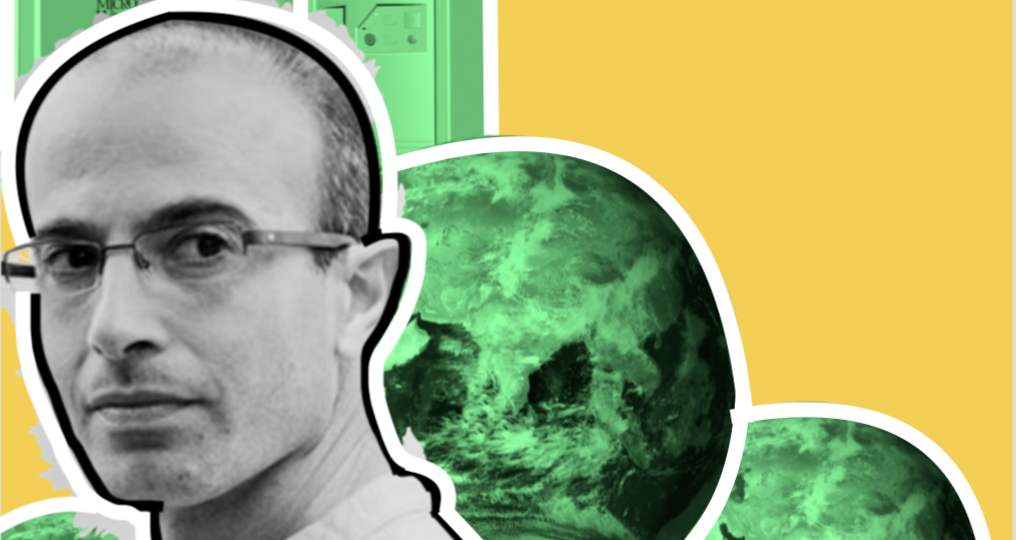“Who am I?” An ancient question, more complicated and critical now than ever before
and central to Yuval Noah Harari’s work. In the age of algorithms, artificial intelligence (AI),
Big Data, machine learning, climate change, and looming uncertainties, Harari draws attention to
important questions and urges us to fundamentally re-examine ourselves in order to understand
who we truly are and the paths we are treading. The Israeli historian, writer, and professor at the
Hebrew University of Jerusalem has published three bestsellers in the past four years, covering a
variety of provocative and alarming ideas. Sapiens: A Brief History of Humankind (2014) has
been translated into more than 30 languages and reviews the evolution of Homo sapiens. Homo
Deus: A Brief History of Tomorrow (2016) explores the possible futures of our species. His most
recent book, 21 Lessons for the 21 st Century (2018), was released this August and looks to the
present. It can be read as both a warning to maintain mental flexibility and emotional balance
while the 21 st century races forwards and as an appeal to humanity to outpace algorithms in the
competition to know ourselves best – an appeal Harari has recognized as the oldest one in the
books – to know what you are, why you are, who you are.
In a talk at the World Economic Forum annual meeting earlier this year, Yuval Harari
noted that Earth may be dominated by entities very different from Homo sapiens in the near
future because we will learn how to engineer bodies, brains, and minds. He argues data has
become the most important asset in the world since machines use computing power, biometric
information, and an understanding of thoughts, feelings, and desires to “hack” humans. Meaning
algorithms may begin to understand us better than we could ever hope to understand ourselves,
identifying and classifying our desires before we even have them. Both disconcerting and
futuristic, these ideas stir our minds from their comfortable slumber. In a situation where
algorithms employed by powerful corporations discreetly monitor and “hack” humans, where we
entrust Amazon, Netflix, Google, or Facebook with more and more authority, the notion of free
will seems to disintegrate completely.
In an interview with Andrew Anthony from The Observer, Harari speaks about the
danger of free information in the news industry, because attention-grabbing and attention-selling
to advertisers or politicians traps the industry in a cycle of ever more sensational stories less and
less concerned with truth or relevance. In this sense, the fake news epidemic results from an
external system able to understand your feelings better than you and tailor stories to match your
individual preferences or tastes. A central concern of Harari’s work is human psychological
resilience to change in the face of rapid modern developments. In his personal opinion,
meditation is a helpful way to develop this resilience and differentiate between fiction and
reality.
Harari himself practices Vipassana meditation daily and has not owned a smartphone
since September of 2017. He does not consume any animal products and has made the case on
many occasions for respecting the sentience of all beings. In a 2015 article for The Guardian, he
identifies industrial farming as “one of the most pressing ethical questions of our time” given
that animals have been the main victims of history. He describes domesticated animals as the
most numerically successful in the world, but as individuals, they are the most miserable. The
physical, emotional, and social needs shaped generations ago and shown by evolutionary
psychology to still be experienced today are completely ignored by the unscrupulous system they
are confined within. Harari contends this is not an ethical “side issue” and actually concerns tens
of billions of sentient beings with complex sensations and emotions who live and die on an industrial production line. As human power and our ability to harm and benefit other animals
grow, so does the need to account for the welfare of all species, not just that of Homo sapiens.
During a Penguin Talk with 350 young people in South London, Harari and Russell
Brand cover a variety of issues from the changing meaning of work to human cooperation, from
the dangers of artificial intelligence to the need for ethics, from technological advancements to
world peace and mindfulness. After various intelligent questions raised by the young audience,
he discusses the laziness of the human mind, defining media echo chambers as one example of a
place in which the mind is not challenged. He goes on to say that it is our responsibility to break
out of the echo chamber and “walk the last mile yourself,” since information is easier to access
now than ever before. In fact, Harari highlighted one of the biggest contemporary problems as
being flooded with enormous amounts of information and being unable to tell what is important
and what is not. For educational institutions, the most important task today is to teach students
how to focus their minds by providing tools to find a way through the ocean of information
without drowning in it.
Another intriguing theme discussed was ethics. Harari finds that we need to understand
and engage with this theme much more deeply than we currently do. In his opinion, computer
engineers especially should be required to take courses in ethics and philosophy – given the
potential risks of AI. Naturally, the same technology presenting dangers can be used to create a
better world. However, it would be unwise to focus simply on the promise and possibility when
the future of life on Earth may change irreversibly. During the conversation, Russell Brand
mentions how spiritual, intellectual, and emotional advancement have not accompanied the fast-
paced technological and informational advancements of this era. In response, Harari suggests a
greater focus on government policies and ethics as a crucial part to the prevention of worst case
scenarios and insurance that new technology is used in the safest way. Equally important is the
widening of our perspectives on the world from a national to a global lens, as the age of global
warming, AI, and automation will not produce equally distributed impacts among states. He
recognizes the pressing need to develop a global safety net and look beyond the traditional
confines of our collectively held ideas.
Should you decide to engage with Harari’s thoughts, even superficially, you will
encounter one crucial and undeniable fact. The future is yours to shape. If you do choose to
embark with him upon the quest for lively debate, for reason, for edifying ethics, Harari will
leave you with many frightening possibilities, highly intriguing thoughts, and most importantly,
the feeling that individuals are powerful. That you should choose to learn about developments of
the past, ponder opportunities of the future, and passionately pursue knowledge about yourself
and the world in the present. In his interviews, books, and discussions, Harari never claims to
have all the answers. But he zooms in on the central issues of our time, unafraid to start
controversial debates confronting humanity’s errors, illusions, and potential. As Homo sapiens or
“wise men,” our species would do well to address the ideas raised by this exemplary human and
remember to answer the question defining our collective future on this planet – who am I?




